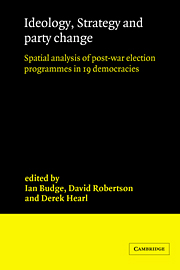 Ideology, Strategy and Party Change
Ideology, Strategy and Party Change Book contents
- Frontmatter
- Contents
- List of Tables
- List of Figures
- Preface
- 1 The influence of election programmes: Britain and Canada 1945–1979.
- 2 The internal analysis of election programmes.
- 3 Britain, Australia, New Zealand and the United States 1946–1981, an initial comparative analysis.
- 4 Canada 1945–1980: party platforms and campaign strategies.
- 5 Sri Lanka 1947–1977: elite programmes and mass politics.
- 6 Israel 1949–1981.
- 7 Ireland 1948–1981: issues, parties, strategies.
- 8 Northern Ireland 1921–1973: party manifestos and platforms.
- 9 Sweden and Denmark 1945–1982: election programmes in the Scandinavian setting.
- 10 The Netherlands 1946–1981.
- 11 Belgium 1946–1981.
- 12 Luxembourg 1945–1982: dimensions and strategies.
- 13 Austria 1945–1978.
- 14 Electoral programmes in West Germany 1949–1980: explorations in the nature of political controversy.
- 15 France 1958–1981: the strategy of joint government platforms.
- 16 Italy 1946–1979: ideological distances and party movements.
- 17 Japan 1960–1980: party programmes in elections.
- 18 Do parties differ, and how? Comparative discriminant and factor analyses.
- Appendices
- General bibliography
- Index
2 - The internal analysis of election programmes.
Published online by Cambridge University Press: 27 October 2009
- Frontmatter
- Contents
- List of Tables
- List of Figures
- Preface
- 1 The influence of election programmes: Britain and Canada 1945–1979.
- 2 The internal analysis of election programmes.
- 3 Britain, Australia, New Zealand and the United States 1946–1981, an initial comparative analysis.
- 4 Canada 1945–1980: party platforms and campaign strategies.
- 5 Sri Lanka 1947–1977: elite programmes and mass politics.
- 6 Israel 1949–1981.
- 7 Ireland 1948–1981: issues, parties, strategies.
- 8 Northern Ireland 1921–1973: party manifestos and platforms.
- 9 Sweden and Denmark 1945–1982: election programmes in the Scandinavian setting.
- 10 The Netherlands 1946–1981.
- 11 Belgium 1946–1981.
- 12 Luxembourg 1945–1982: dimensions and strategies.
- 13 Austria 1945–1978.
- 14 Electoral programmes in West Germany 1949–1980: explorations in the nature of political controversy.
- 15 France 1958–1981: the strategy of joint government platforms.
- 16 Italy 1946–1979: ideological distances and party movements.
- 17 Japan 1960–1980: party programmes in elections.
- 18 Do parties differ, and how? Comparative discriminant and factor analyses.
- Appendices
- General bibliography
- Index
Summary
INTRODUCTION
The cautionary but moderately encouraging conclusions from Britain and Canada are also likely to hold for other countries – certainly for those (like Australia and New Zealand) with similar governmental and party arrangements – but probably for others too.
The country studies reported in Chapters 3–17 all assess the place of the manifesto or its programmatic equivalent in national political processes. The qualitative evidence produced there suggests (even within the context of coalition negotiations) that they form genuine statements of preference rather than mere bargaining counters. The elaborate negotiations of joint programmes before an election, as in Ireland and France in 1973, is an indication of the importance accorded them by parties as well as by the electorate.
These bits of evidence require more systematic investigation to tie them conclusively together. Even so, they allow us to proceed to our ‘internal’ analysis with further reassurance that the texts have an effect on the external world.
Of course election programmes are interesting not only for their bearing on government action, but also for their contribution to the electoral success of the party, to the formation of like-minded coalitions, and to the study of policy-spaces constraining the choices rational actors will make. All these lines of investigation are followed up below and in the parallel analyses currently underway.
THE COMPARATIVE FRAMEWORK
Regardless of the particular interest one has, campaign appeals are studied to best advantage on a comparative rather than on a single-country or single-party basis.
- Type
- Chapter
- Information
- Ideology, Strategy and Party ChangeSpatial Analyses of Post-War Election Programmes in 19 Democracies, pp. 15 - 38Publisher: Cambridge University PressPrint publication year: 1987
- 30
- Cited by


